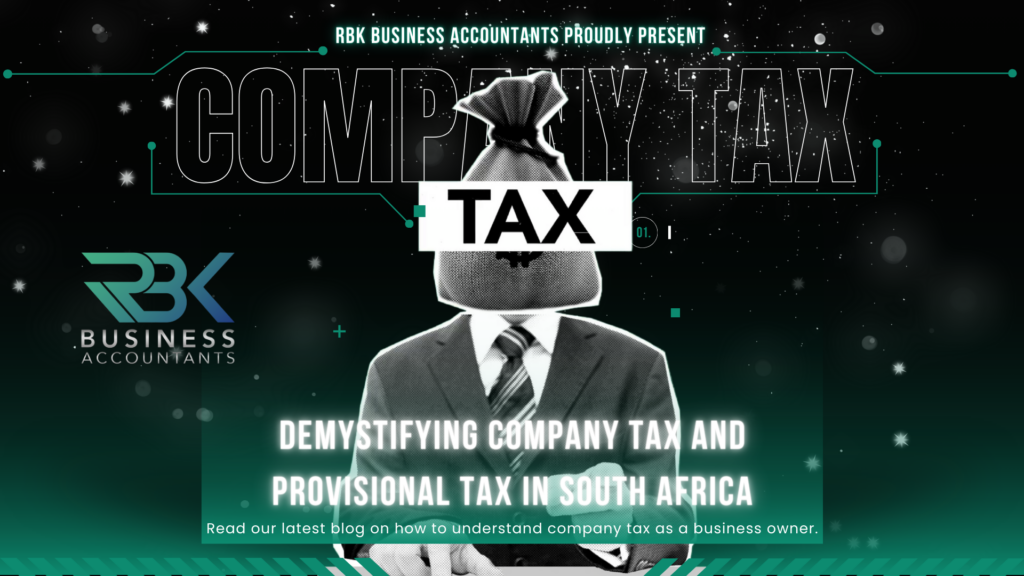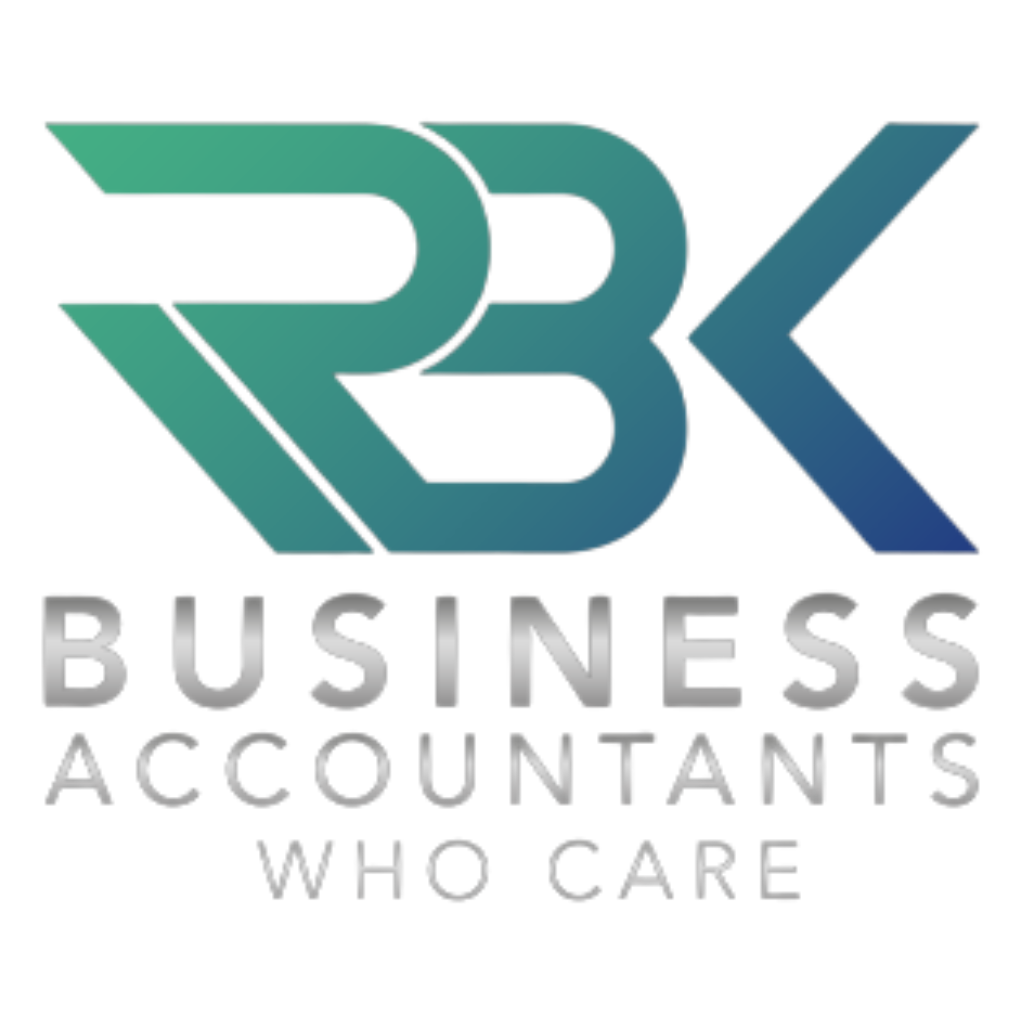Introduction
Navigating the world of taxes can be a daunting task, especially for business owners who may not be well-versed in financial jargon. In South Africa, one crucial aspect that businesses need to understand is company tax. In this article, we’ll break down what company tax is, why it’s important, when company tax returns are due, and explore potential opportunities for reduced tax rates through SBC (Small Business Corporation) tax rates.
What is Company Tax?
Simply put, company tax is a levy imposed by the South African government on the profits earned by businesses operating within the country. The tax is calculated on the taxable income of the company, which is essentially the money left over after deducting allowable business expenses from the total revenue.
What is the difference between Company Tax and Provisional Tax?
For the sake of clarity, provisional tax is not a separate tax. It forms part of company tax. As the name indicates, it’s a “provisional” payment”/ pre-payment.
Provisional tax is a pre-payment of company tax. Basically, SARS wants you to predict what your profits will be for the year, and pay the tax on the predicted profits, and if you underestimate/underpay, you will be charged penalties and interest by SARS.
This is why it’s so important to have a credible accountant who can calculate and guide you with your provisional tax payments.
How do I know If I have overpaid/underpaid?
This is calculated when you submit your final company tax return and your final tax is calculated on actual profits for the year.
The amount of provisional tax you paid for the year will then be deducted from the actual tax amount due and you will either be in a refund situation or you will need to “top up” the shortfall from your provisional tax return.
When are Provisional Tax Returns Due?
For example: All businesses that have a February year-end, are required to make payment of their company tax twice a year in the form of provisional tax returns. This will be in August and February every year.
Late payments and underpayments of provisional taxes will result in heavy penalties and interest payments to SARS, so it is vitally important that businesses accurately calculate their “provisional” profits for the year.
Let’s give you an example of a company that has a February year-end.
For the trading year (1 March 2022 to 28 February 2023) the following is expected of the company.
- August 2022 (Provisional tax payment) | Estimations of first 6 months of trade
- February 2023 (Provisional Tax Payment) | Estimations for 12 months of trade
- February 2024 Company Tax Return due. (Actual tax calculated less August 2022 Provisional Tax Payment and less February 2023 provisional tax payment.
The result will mean that the company either owes SARS because they underpaid their provisional tax or they will be due a refund from SARS if they overpaid their provisional tax.
Consequences of late payments and returns/Non-submission of returns
- Penalties and interest payable to SARS (“Throwing away” unnecessary money to SARS) negatively impacting your cash flow.
- Criminal proceedings which can be actioned by SARS for non-submission and unpaid taxes.
- Jail time
- Non-compliance with SARS which will impact your ability to
- Obtain finance to fund business operations
- Block future sales via private and government contracts as tax clearances cannot be obtained if you are non-compliant.
Non-Compliance can cripple your business if your tax affairs are not prioritised. We unfortunately have personally seen the consequences of clients not prioritising their tax affairs and not taking SARS seriously.
Understanding the Company Tax Rate:
The current company tax rate in South Africa is 27% of a company’s taxable income, which comprises its profits. This means that for every R 100 of taxable income (profits), the company is required to pay R27 in taxes to the government.
Exploring SBC (Small Business Corporation) Tax Rates:
It’s important to note that some businesses may qualify for reduced tax rates through the Small Business Corporation (SBC) tax regime. SBCs are entities with an annual turnover threshold and meet certain criteria outlined by SARS. Qualifying businesses under the SBC regime may benefit from lower tax rates.
For more information on whether your business qualifies for reduced tax rates through the SBC tax regime, we recommend reaching out to our firm. Our experienced professionals can provide personalized guidance based on your specific circumstances and help you navigate the complexities of tax regulations.
Understanding Company Tax Returns:
Company tax returns are documents that businesses need to submit to the South African Revenue Service (SARS) to report their income, expenses, and ultimately, the amount of tax they owe. Filing accurate and timely company tax returns is crucial to stay compliant with tax regulations and avoid penalties.
When are Company Tax Returns Due?
In South Africa, company tax returns are typically due annually, and the deadline for submission is determined by the company’s financial year-end. The financial year-end is the last day of the company’s financial year, which may not necessarily coincide with the calendar year-end. For example. Most businesses in South Africa have a February financial year-end. That means that for the financial year between (1 March to 28 February 2023), the company tax return will be due 12 months later on the 29th of February 2024 (the end of the next financial year).
Here are the key points and a summary to keep in mind regarding company tax return deadlines:
1. **Annual Filing Deadline:** Companies are generally required to submit their tax returns within 12 months after the end of their financial year.
2. **Provisional Tax Payments:** Companies are also required to make provisional tax payments during the year, which are prepayments towards their annual tax liability. Failure to make these payments on time may result in penalties.
3. **Penalties for Late Filing:** It’s crucial to submit company tax returns on time. Late submissions may result in penalties and interest charges, negatively impacting the financial health of the business.
Conclusion
Navigating the world of company tax in South Africa doesn’t have to be overwhelming. By understanding the basics of what company tax is, why it’s important, and when tax returns are due, business owners can ensure compliance with tax regulations and contribute to the overall development of the nation. If in doubt, seeking advice from tax professionals, especially regarding SBC tax rates, can provide valuable assistance in managing your company’s tax responsibilities. And remember, with the current company tax rate set at 27%, careful consideration of taxable income is essential for effective financial planning.
























